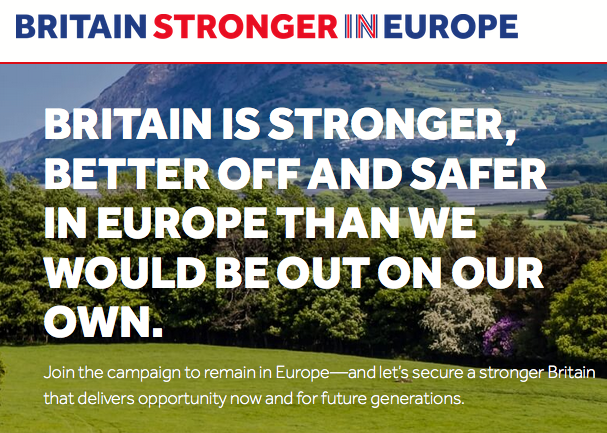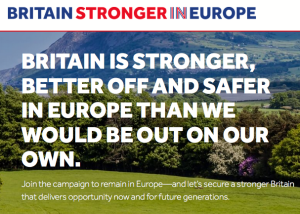Britain Stronger in Europe – horrible framing and imagery, and a message bordering on the disingenuous

 So, all hail the ‘Remain’ side in the referendum campaign! Place your trust in “Britain Stronger in Europe“, the Will Straw and Stuart Rose campaign. It’s like the late-1990s “Britain in Europe“, only with more muscle, more fight, and more nationalist fervour!
So, all hail the ‘Remain’ side in the referendum campaign! Place your trust in “Britain Stronger in Europe“, the Will Straw and Stuart Rose campaign. It’s like the late-1990s “Britain in Europe“, only with more muscle, more fight, and more nationalist fervour!
Gone are the solitary star and the yellow line in the 1990s logo, and here are the reds and blues of the UK Union Flag. As Bloomberg pointed out, the European Union itself was not even mentioned at the launch, and – at the time of writing – the words “European Union” and “EU” are not mentioned anywhere at all in the Stronger In website.
That’s not being clever; that’s actually disingenuous, and you can’t possibly expect people to not see through that.
Sorry, Remain campaigners, but all of this is no good. You cannot out-nationalist, out-patriotise, out-flag-wave the antis. So don’t actually try. By campaigning this way you concede the turf to them. OK, I am sure someone somewhere in a focus group told you that nationalism and patriotism pushes voters’ buttons, but sounding like a nationalist to be pro-EU, oops, sorry, pro Britain Stronger in Europe, is like going backwards to go forwards.
That you keep on putting “Stronger” in every sentence sounds rather macho and this is wrong too. Too much of the vocabulary around Britain’s relationship with the EU is about fighting, winning, and masculine shows of strength. As I’ve argued before, being seen to want to “win” is a problem for Cameron’s renegotiation. Yet here we go putting strong or stronger in every sentence.
The Leave folks must be rubbing their hands with glee about this. An establishment-led (see its board here – FT (€)), poorly framed and poorly communicated Remain campaign, whose chair says people “will make a hard-headed, practical calculation in the coming referendum”. No they won’t. Have these people learned nothing from the fiascos of Yes to Fairer Votes and Better Together?
@tst – I’d advise you look at some literature about framing in political communications (Lakoff “Don’t think of an elephant” for example). The main message is you don’t fight a battle on the turf of your opponents, as the frame sticks with them rather than you, and you suffer. So by sounding nationalist, the debate goes in a nationalist direction.
Oh, and you think Better Together and Yes to Fairer Votes were good campaigns? OK, Better Together managed in the end, but it was scary towards the end.
So much wrongness in one post…..
I think it was pretty clever. Sure that nationalists are always going to win with hardcore nationalists. However by framing the debate was what’s in the countries interest you neutralise your opponent’s strongest message. Furthermore is they’ve actually got a pretty good argument on that front. What could be less patriotic than driving your country down a course that will diminish its influence and harms its trade….
In any case the debate isn’t aimed at people like you. Its aimed at swing voters. The type of people who actually might be persuaded by superficial nationalist arguments if they are not adequately countered.
I’m afraid this is all rather symptomatic of spending too long discussing things with ardent Europhiles and ridiculous EU trolls on twitter. The debate and its framing needs to be aimed at people who otherwise probably wouldn’t give a sh*t either way! Ultimately like the Scottish debate its going to be a question of whether rational arguments (about the risks of leaving/independence) beat the innate tribal pull of nationalism! As in Scotland, the hope is common sense will prevail.